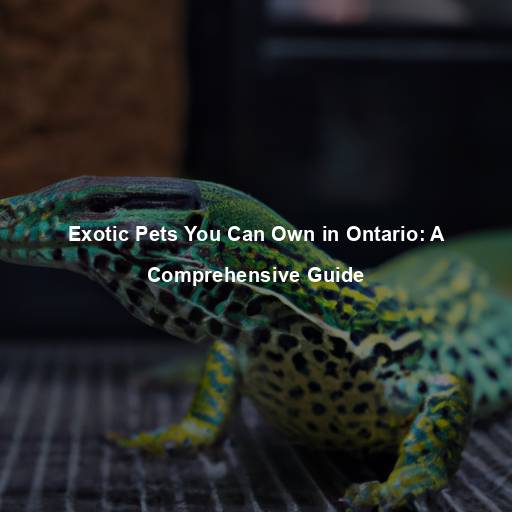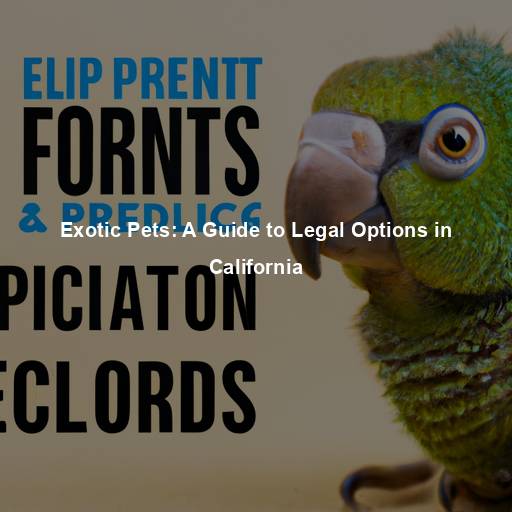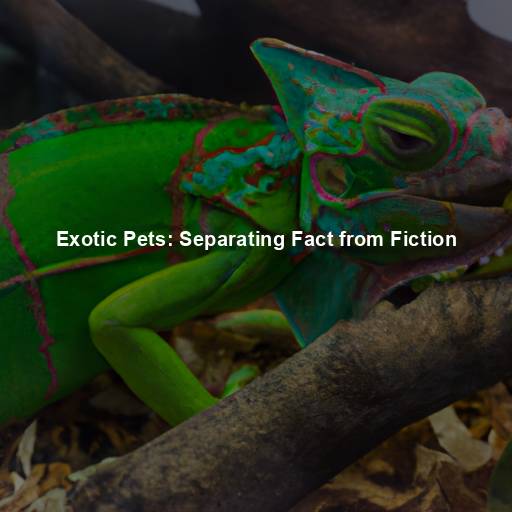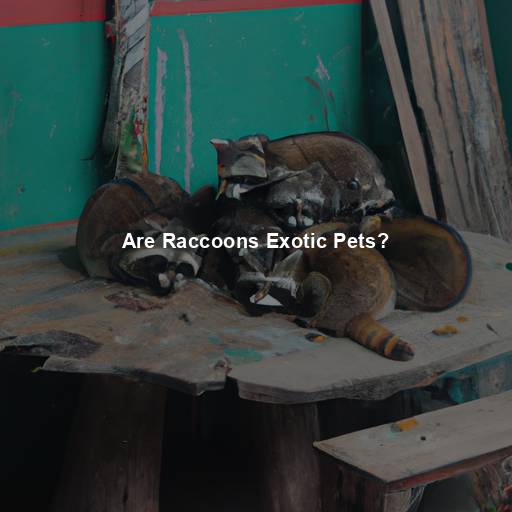Exotic Pets You Can Own in Ontario: A Comprehensive Guide
Last Updated on November 2, 2023 by Evan
Contents [hide]
- 1 Understanding the Fascination with Exotic Pets
- 2 Legal Considerations and Licensing Requirements
- 3 Fascinating Exotic Pets Permitted in Ontario
- 4 The Importance of Responsible Ownership
- 4.1 Thorough Research
- 4.2 Proper Enclosure and Environment
- 4.3 Nutritional Considerations
- 4.4 Regular Veterinary Care
- 4.5 Commitment and Time Investment
- 4.6 Small Primates: Marmosets and Tamarins
- 4.7 Aquatic Delights: Axolotls and Freshwater Turtles
- 4.8 Feline Charisma: Servals and Savannah Cats
- 4.9 Prickly Wonders: Porcupines and Hedgehogs
- 4.10 Arachnid Enthusiasts: Tarantulas and Scorpions
- 5 FAQs – Exotic Pets You Can Own in Ontario
- 5.1 What are considered exotic pets in Ontario?
- 5.2 Are there any restrictions on owning exotic pets in Ontario?
- 5.3 What are the requirements to legally own an exotic pet in Ontario?
- 5.4 Can I own a snake or reptile as a pet in Ontario?
- 5.5 Are there any exotic pets that are completely prohibited in Ontario?
- 5.6 How can I find out more information about owning an exotic pet in Ontario?
Understanding the Fascination with Exotic Pets
Throughout history, exotic pets have mesmerized people from all corners of the globe, leading them on an enchanting journey into the realm of extraordinary companionship. The province of Ontario, nestled in the heart of Canada, has become a haven for those yearning to share their homes with these captivating creatures, defying societal norms and embracing the unconventional. Yet, like an enigmatic puzzle waiting to be solved, the path to owning an exotic pet is lined with intricate challenges and perplexing legalities. In this gripping exposé, we dive headfirst into the tantalizing world of unusual companions in Ontario, guiding you through a labyrinth of regulations and illuminating the secrets of these bewitching creatures.
Legal Considerations and Licensing Requirements
Before embarking on the journey of owning an exotic pet in Ontario, it is crucial to familiarize yourself with the legal framework surrounding these unique animals. The Ontario Fish and Wildlife Conservation Act, along with several other regulations, governs the ownership and possession of exotic pets. The legislation aims to protect both the animals and the general public, ensuring their safety and well-being.
Thinking of adding an exotic pet to your family? Well, buckle up for a wild ride through the realm of regulations and permits. To dive into the world of legal ownership, you’ll need to leap through some bureaucratic hoops: filing applications, delving into species specifics, and showcasing your stellar pet-parenting abilities. Don’t get tangled in the vast wilderness of legalities; seek guidance from the Ontario Ministry of Natural Resources and Forestry or a savvy legal expert to unravel the mysteries of exotic pet ownership.
Fascinating Exotic Pets Permitted in Ontario
Ontario’s regulations on legal exotic pets may leave some people perplexed, as the list is not comprehensive. However, for those who are curious about these captivating creatures, there are still a number of fascinating species that can be owned with the necessary permits. From enchanting reptiles to extraordinary birds, let’s delve into the world of these extraordinary pets that will surely spark curiosity and awe.
Sugar Gliders
Sugar gliders, adorable small marsupials native to Australia, have gained popularity as exotic pets. These nocturnal creatures are known for their gliding ability, thanks to the patagium, a skin membrane stretching from their wrists to their ankles. Sugar gliders are highly social animals and require plenty of mental stimulation and interaction to thrive in captivity. Proper housing, a balanced diet, and regular veterinary care are essential for their well-being.
Hedgehogs
There’s something incredibly captivating about hedgehogs – their prickly spines and charming personalities have bewitched the hearts of countless exotic pet enthusiasts. These enigmatic creatures are renowned for their nighttime adventures and the extraordinary feat of transforming into a compact ball for protection. Creating a suitable habitat for these small mammals involves meticulous regulation of temperature and humidity, while their dietary needs call for a delicate balance of premium hedgehog food, accompanied by the occasional indulgent treat. Establishing a bond through regular interaction and socialization is pivotal to guarantee their ease in our human presence.
Reptiles: Bearded Dragons and Ball Pythons
If you are an enthusiast of exotic pets, then you must have heard of the enchanting bearded dragons and mesmerizing ball pythons. With their striking spiky exterior and gentle demeanor, these reptiles have become the epitome of sought-after companions. Originating from the breathtaking landscapes of Australia, bearded dragons are the embodiment of unique beauty and a calm temperament. However, in order to provide them with the best care possible, one must create a spacious habitat equipped with temperature controls, UVB lighting, and a diverse menu that includes a blend of insects and vegetables.
Unveiling the mesmerizing allure of Africa’s enigmatic creatures, ball pythons have captivated the hearts of snake aficionados around the world. With their petite stature and serene disposition, these enigmatic serpents exude an undeniable charm. The intricate tapestry of their existence rests upon the delicate balance of a carefully crafted habitat, meticulously designed to provide the perfect harmony of warmth, humidity, and secluded nooks. And, lest we forget, their nutritional desires must be meticulously met with a harmonious feast of precisely sized rodents, a culinary delight fit for their discerning palates.
Avian Companions: Cockatiels and Lovebirds
For those who appreciate the charm and beauty of birds, cockatiels and lovebirds are delightful options for exotic pets. Cockatiels, native to Australia, are known for their striking crest, vibrant plumage, and playful personalities. These intelligent birds require spacious cages, a nutritious diet, and mental stimulation through toys, social interaction, and regular exercise.
Lovebirds, originating from Africa, are small parrots that captivate with their colorful feathers and affectionate nature. These social birds thrive in pairs or small groups and necessitate a large cage, a varied diet, and regular mental and physical stimulation to prevent boredom and behavioral issues.
The Importance of Responsible Ownership
While the allure of owning an exotic pet is undeniable, it is essential to emphasize the importance of responsible ownership. Exotic animals have unique needs and require specialized care to thrive in captivity. Here are some key considerations for potential owners:
Thorough Research
Before bringing an exotic pet into your life, conduct thorough research to understand the specific requirements of the species you are interested in. Gain knowledge about their habitat, dietary needs, socialization requirements, and potential health issues. Ensure you are adequately prepared to meet these needs before committing to ownership.
Proper Enclosure and Environment
Ensuring the optimal living conditions for your unique and captivating exotic pet is an absolute must. From the moment they enter your world, you need to be in tune with their needs, offering them a safe abode that mirrors their natural surroundings. Pay meticulous attention to temperature levels, humidity control, and the ideal substrate. Moreover, infuse their space with various enriching elements to keep them intellectually stimulated and joyfully perplexed.
Nutritional Considerations
Proper nutrition is crucial for the health and longevity of exotic pets. Research the dietary requirements of the species you intend to own and ensure you can provide a balanced diet that meets their nutritional needs. Consult with a veterinarian experienced in exotic pet care to develop a suitable feeding plan.
Regular Veterinary Care
Exotic pets, like any other animals, require regular veterinary care to monitor their health and detect any potential issues early on. Find a qualified veterinarian with experience in caring for the specific species you own and schedule regular check-ups to ensure your pet’s well-being.
Commitment and Time Investment
Owning an exotic pet requires a significant commitment of time, energy, and resources. These animals often have long lifespans and demand attention, socialization, and mental stimulation. Ensure you can dedicate the necessary time and resources to provide the best possible care for your pet throughout its life.
Small Primates: Marmosets and Tamarins
Over the past few years, there has been a surge in the fascination with marmosets and tamarins—charming little primates hailing from the enchanting landscapes of South America. But let’s not be fooled by their undeniable cuteness, as these intelligent creatures demand unwavering commitment and resources from their potential owners. Creating a world that mirrors their native habitats—complete with sprawling enclosures adorned with endless branches for climbing and exploring—is a must. Moreover, one mustn’t forget the importance of a diverse diet, comprising juicy fruits, wholesome vegetables, and tantalizing insects, to keep these vivacious beings in optimal health.
Aquatic Delights: Axolotls and Freshwater Turtles
If you’re someone who finds themselves utterly enchanted by the mysteries of the underwater realm, then the notion of nurturing an aquatic exotic pet might stir some profound curiosity within you. Picture this: Axolotls, otherwise known as the mesmerizing Mexican walking fish, possess an extraordinary knack for regenerating their own body parts – a phenomenon that simply boggles the mind! In order to provide them with the best care possible, it is vital to create a meticulously maintained aquarium, complete with all the necessary elements for their well-being, including proper water conditions and a variety of hideaways for their clever little bodies to explore. And let’s not forget the importance of their dietary needs; offering them a thoughtfully composed menu of live or frozen foods, brimming with tantalizing options like bloodworms and brine shrimp, is a key secret to unlocking their optimal health and development.
Freshwater turtles, such as red-eared sliders and painted turtles, are popular choices for reptile enthusiasts. These captivating creatures necessitate a spacious aquatic habitat with both land and water areas, allowing them to exhibit their natural behaviors. A well-balanced diet consisting of commercial turtle pellets, leafy greens, and occasional protein sources is crucial for their health.
Feline Charisma: Servals and Savannah Cats
Step into the world of feline fascination, where the allure of majestic big cats is entwined with the charm of pint-sized packages. Enter the realm of servals and Savannah cats, captivating creatures that captivate the senses with their enigmatic allure. Hailing from the depths of Africa, servals emerge as mesmeric medium-sized wild cats, their elegant appearance and impeccable agility casting a spell upon onlookers. However, embarking on the journey of owning a serval necessitates a profound understanding and expertise in the exotic feline realm, as these enigmatic beings demand meticulous care and attention.
Discover the captivating world of Savannah cats, a mesmerizing mix of untamed beauty and domestic allure. These alluring feline companions embody a unique blend of grace and wild charisma. Nevertheless, it is imperative to acknowledge their innate wild instincts and to approach their care with utmost attentiveness. As prospective owners, it is vital to conduct thorough research to comprehend their distinct requirements and adhere to the legalities governing the ownership of these enigmatic hybrid creatures.
Prickly Wonders: Porcupines and Hedgehogs
In the ever-evolving world of pet ownership, hedgehogs have long been in the spotlight as quirky and unconventional companions. However, let’s divert our attention for a moment to a fascinating member of the spiky family: the enigmatic porcupine. Unlike their more popular counterparts, porcupines form extraordinary connections with devoted individuals who are willing to go above and beyond to provide the specialized care they require. These captivating creatures thrive in expansive enclosures that offer ample climbing opportunities and thrive on a diet rich in fresh vegetables, fruits, and top-notch commercial rodent chow.
Arachnid Enthusiasts: Tarantulas and Scorpions
For those with a fascination for the creepy crawlies, tarantulas and scorpions offer a unique experience as exotic pets. Tarantulas are renowned for their intricate web-spinning abilities and diverse range of colors and patterns. These low-maintenance arachnids require a well-ventilated terrarium with appropriate substrate and hiding spots. Their diet consists of live insects, such as crickets and roaches, which provide the necessary nutrients for their survival.
The enigmatic and awe-inspiring scorpions, known for their venomous nature, never fail to capture our imagination. Surprisingly, in the province of Ontario, several intriguing species of scorpions can be owned as pets, introducing an element of thrilling mystery into our homes. To accommodate these enigmatic creatures, secure enclosures with tightly sealed lids and suitable substrates for their intricate burrowing behaviors are a must. Additionally, providing them with a steady diet of live insects like crickets and mealworms, carefully chosen to meet their unique nutritional requirements, adds an extra layer of perplexity to their captivating presence.
FAQs – Exotic Pets You Can Own in Ontario
What are considered exotic pets in Ontario?
In Ontario, exotic pets are referred to as “restricted” animals by the Ministry of Natural Resources and Forestry. These include various species of reptiles, amphibians, primates, certain large cats, certain large birds, and some non-human primates. It is important to note that specific regulations and restrictions may vary depending on the municipality, so it is recommended to check with local authorities before considering owning an exotic pet.
Are there any restrictions on owning exotic pets in Ontario?
Owning exotic pets in Ontario is a captivating journey filled with twists and turns. The Ontario government, in their quest to uphold wildlife conservation, has meticulously crafted guidelines under the Fish and Wildlife Conservation Act to navigate the perplexing realm of possession, breeding, and sale of these extraordinary creatures. Brace yourself for a burst of regulations, as permits and licenses take the reins, ensuring every T is crossed and every I is dotted when it comes to housing, care, and transportation of these enigmatic companions. However, be wary, for there are limits to this audacious pursuit: species such as the majestic primates, chimpanzees and gorillas, are deemed unsuitable for the captivating role of pets in the province of Ontario.
What are the requirements to legally own an exotic pet in Ontario?
To legally own an exotic pet in Ontario, one must adhere to certain requirements. These may include obtaining a Wildlife Custodian Permit or an Exotic Animal License from the Ministry of Natural Resources and Forestry. A thorough application process is usually involved, which typically includes providing information about the species being kept, the purpose of ownership, and proof of appropriate facilities and enclosures. It is essential to comply with the specific regulations associated with the chosen exotic pet and maintain the required standards of care.
Can I own a snake or reptile as a pet in Ontario?
Yes, it is legal to own snakes and other reptiles as pets in Ontario. However, some species may require permits or licenses depending on their size and classification. For example, venomous snakes generally require a Captive Wildlife Permit, while certain large constrictor snakes above a designated length threshold may need an Exotic Animal License. It is crucial to research the specific requirements for the particular snake or reptile species you intend to keep and adhere to all regulations to ensure compliance.
Are there any exotic pets that are completely prohibited in Ontario?
Yes, there are certain exotic pets that are strictly prohibited in Ontario. Primates, including chimpanzees, gorillas, and orangutans, are illegal to own as pets. Other animals such as lions, tigers, jaguars, cougars, lynx, and alligators, among others, are also prohibited. These regulations are in place to prioritize animal welfare, public safety, and environmental concerns.
How can I find out more information about owning an exotic pet in Ontario?
For more information regarding owning an exotic pet in Ontario, it is recommended to contact the Ministry of Natural Resources and Forestry or the local municipality’s animal control office. They can provide detailed information on the specific laws, permits, licenses, and care guidelines associated with owning and keeping exotic animals. Consulting with experienced exotic pet owners or joining reputable exotic pet communities can also be helpful in gaining insights and practical advice before considering ownership.







